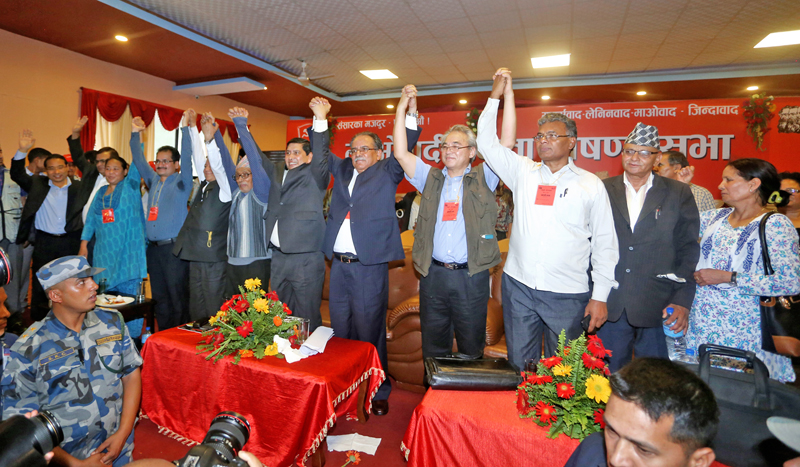Prachanda Pulls Out Yet Another Rabbit from the Nepal Hat, But Is It Little More Than an Illusion?

KATHMANDU: Nepal's Maoist leader Pushpa Kamal Dahal Prachanda’s hunger for experimenting with Maoist ideology is unending. In his long career as the Maoist supreme leader he often took decisions unheard of before by Marxist practitioners. He once wanted to align with King Birendra against the parliamentarians; next he forged an alliance with seven parties against King Gyanendra. During the initial days of insurgency he called India an expansionist power but later revised his stand and worked under its mediation. His experiments didn’t always go well with his party comrades as well as other Marxist leaders and parties of the world, but that didn’t deter him.
Recently Prachanda successfully repeated what he had achieved before initiating the people’s war in Nepal on February 13, 1996 or Fagun 2, 2052 B.S. He united 10 splintered Maoist groups or parties to form the Maoist Centre. Previously, these groups were part of his party but had broken away blaming him of betraying the revolution. The leaders thus united now include Matrika Yadav, Mani Thapa and Ram Bahadur Thapa ‘Badal’. Not so long ago Badal used to call Prachanda an Indian R&AW agent and he did his best during the second Constituent Assembly election to defeat Prachanda’s party. He travelled miles of Nepal’s difficult terrain on foot and on horse’s back to persuade people to rise against Prachanda.
Similarly, Mani Thapa too didn’t have a good relationship with Prachanda until this unity. Just before the Maoists joined open politics, the party had issued a ‘death’ warrant against him forcing him to take shelter in Darjeeling. Twelve of Mani Thapa’s supporters were abducted and kept in Kabre near Kathmandu under ‘arrest’, and allegedly tortured to disclose Mani Thapa’s whereabouts. Mani used to secretly cross from Jalpaiguri and plead with ‘soft’ comrades like Krishna Bahadur Mahara and Baburam Bhattarai for his comrades’ release.
Matrika Yadav, a former Forest Minister was until recently trying to forge an alliance of ‘like minded’ comrades to counter ‘Prachanda’s arrogance’. A few days before he united with Prachanda I had a long conversation with him in Delhi where he showed me a document he said he had given to Prachanda listing his party’s conditions for unity. As far as I could read from the document, unity looked impossible on those terms. Matrika wanted assurances that would in effect declare the new constitution reactionary, agreeing on principle for violent revolution and the right to national self determination of Madhesi and other nationalities. Matrika called the whole exercise a washover necessitated by pressure from the people of Nepal and his own party comrades.
Apart from these three leaders there are now people from different schools of thought in the party. There are people like Bishwo Bhakta Dulal 'Aahuti' in the party’s politburo who see Nepal’s unification by Gurkha King Prithvi Narayan Shah as hinduization of tribal people and unnatural imposition of a Brahmanist Varna System on a subjugated people. Also there are leaders like Laxman Panta, until recently a member of Kiran’s party, who are critical of tribal or janjati, madheshi and minority leaders’ for viewing Nepal from English eyes.
This jumble of contradictory and opposite thoughts doesn’t give sign of long-lasting unity. It looks more like a pre-poll alliance, survival of which will depend on the party’s election result. Even if the party does well in the election there is no guarantee that this unification will last. More so as shifting loyalties are acceptable values in Nepali politics.
By uniting these groups Prachanda has taken a very serious, if not miscalculated, risk. In Matrika Yadav he now has a face to project in the plains of Nepal, and in Badal and Dev Gurung he can reach out to janjati or tribal people. However it will not be easy for him to have complete and and undemanding loyalty from these leaders before and after the elections. Navigating through these difficult waters will be a difficult challenge for Prachanda.
However, Prachanda must be given credit for achieving what was looking impossible until recently. His ingredients are delicately balanced in what can be a good cocktail, but a wrong measure could spill it even before the people have had a chance to vote on the taste.



